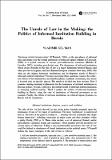| dc.description.abstract |
‘Informal Institutionalisation’ (O’Donnell, 1996), or the prevalence of informal rules and norms over the formal institutions of political regimes (Merkel & Croissant, 2000), is a typical outcome of various post-authoritarian transitions (Helmke & Levitsky, 2003), including post-Soviet ones. The dominance of informal institutions which create obstacles to the rule of law is a major distinction between Russia (and other post-Soviet regimes) and most Eastern European countries (Gel’man, 2003). But what are the origins, formation mechanisms and development trends of Russia’s informal political institutions? Because answering these questions requires the collec- tive efforts of the international and interdisciplinary academic community, this article is focused only on specific aspects. The article is divided into four sections. First, I examine existing structural explanations for the dominance of informal institutions in Russian politics. Second, I present a procedural model of informal institutionalisation in emerging political regimes. Third, I analyse the politics of informal institution building in Russia, using the case of institutions of electoral governance as an example. Finally, the effects of informal institutions on political regime dynamics in Russia will be considered. |

